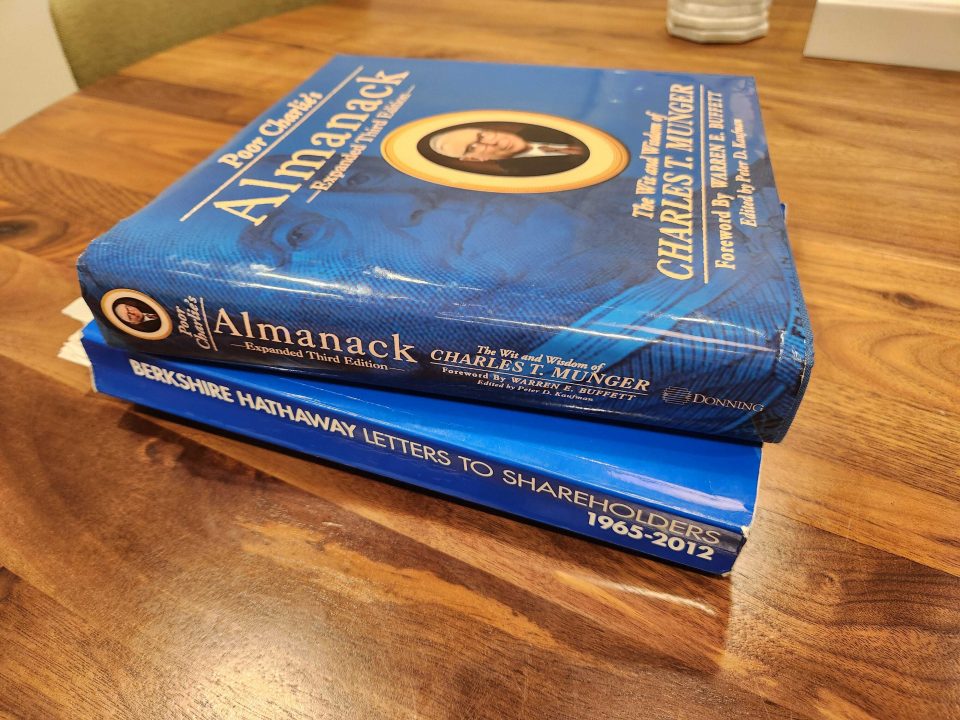
The Collected Works of Buffett and Munger
March 11, 2025By Clark Troy
To start yet another column with a famously hackneyed quote, Ben Franklin wrote in a 1789 letter to a French scientist “In this world, nothing is certain except death and taxes.” We kind of know this all the time, because we’re always paying one kind of tax or another, whether it be sales tax or property tax or income tax or (for the most affluent amongst us, likely not me) estate tax or even the elevated price of consumer goods due to tariffs, ostensibly a tax levied on imports but one which consumers typically bear. But at some point in time many of us end up having a date with what I could only call Taxes, a complex situation in which we come face to face with the regrettable reality of a tax-collecting authority. I have in mind that most dreaded rite of passage into full-on adulthood, The IRS Audit.
Here's how it went down with us. My wife Mary Berridge had a book of photographs to publish (copies are still available for purchase here!). Because she is an amazing photographer with real credentials and had worked for years on this project, we needed to partner with a serious publisher of photography books. Unfortunately, in today’s world (and it was probably ever thus), if one is not a very famous artist, publishing a high-quality art book means assuming major expenses oneself. There aren’t a lot of funders around. In the case of this specific publisher, we paid them some thousands of dollars and they shipped us a bunch of books and retained a bunch to market themselves. Our path to profit was to sell the books, with the constraint that we couldn’t sell through bookstores, a channel reserved for the publisher itself.
So in tax year 2021 our CPA netted up all the expenses associated with the publication of Mary’s book and entered them on line 27a of Schedule C of the 1040, after detailing them out in Part V of the same Schedule. The expenses exceeded our revenue for the year for that business, giving us a net loss for the year and reducing our taxable income by that amount. All perfectly normal. We would partially recoup those losses in future years not just through sales of books but also through momentum towards exhibits, photo sales and other ancillary revenue (speaking fees, potential teaching engagements, etc.).
We went on with our lives. Then one sunny day in 2024, I went to my mailbox and what did I find but a dreaded thick envelope from the IRS, requesting information about the expenses. Thankfully, we had done a decent job of retaining receipts and records which I returned as per the IRS’s request for supporting documents.
Another envelope arrived. We were being audited. I sent more information, including a narrative description of our business logic and a more granular description of how specific expenses tied to specific purposes. No luck. They kept writing back with boilerplate requests for “more information,” which I duly provided.
Eventually I spoke to someone in an IRS call center and described the situation. Although due to system limitations she couldn’t see our documents she said that what I described to her seemed perfectly reasonable and our expenses should be allowable. We discussed how I should respond and I did. No luck. I got my CPA involved. He talked to a supervisor in the IRS audit department who agreed that our expenses seemed reasonable, and she sent it back down through the audit queue.
No luck. Eventually my CPA advised that I just give up and pay because the expense and effort required to fight in tax court would be too large to justify the benefit. Even though most sources on the internet indicate that if one goes to tax court and fights an IRS judgment most of the time one can get some kind of settlement.
So I mailed in a check. I’m still waiting for it to clear. I hope this is all done and dusted.*
Before concluding I would be remiss if I failed to mention the ultimate absurdity. To expedite the process the IRS lets users upload documents for consideration by the audit team. However, the documents cannot contain a ridiculous number of special characters, things like ampersands, curly quotes, etc. But one of the special characters is the good old dollar sign. Yes, you read that right, a document submitted to the IRS cannot contain the character “$.” At this point in time Kafka is likely sitting up in his grave smacking himself on the forehead and saying: “I couldn’t have scripted it any better.”
***
If it’s not too early to look back on this affair, here are a few thoughts. Our audit was probably tripped by an algorithm because our 2021 expenses differed so dramatically from all prior years and impacted our taxes so materially. I’m fine with that. American persons and corporate entities file about 160 million tax returns a year. The IRS employs about 94,000 people, of whom 79,000 are full-time employees. This number will likely decrease as the new administration unleashes their holy fire upon the much-vilified agency, egged on by the swamp-haters.
Most IRS employees most likely focus on big cases of malfeasance with the potential for large recoveries. Mary and I got caught in some netherworld of algorithm-driven audits serviced by someone other than the Agency’s best and brightest.
I am far from delighted with this outcome. However, beyond drafting this blog post and occasionally telling the same story over dinner or drinks with humorous embellishments, it’s not worth my time to do anything about it.
At a high level, it does indicate that not just the tax code but the infrastructure for enforcing it acts as a pretty strong disincentive for doing much other than being an employee in the United States. Unless your business reaches a certain scale, one risks falling into the bucket of being too small to fight certain battles.
Lastly, let me just say that we should all be careful in judging people because things happen to them. We got audited and lost. We are not crooks. Keep that in mind next time somebody says they got audited.
*I mailed the check January 7. It cleared on January 29.
This article originally appeared on Straight Edge Finance. Click here to read more from Clark Troy.




